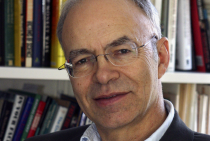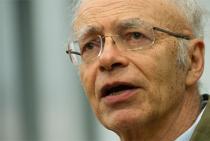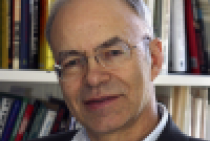Donald Trump has wasted no time clarifying what “America First” – the dominant idea driving his election campaign – means in practice. So far, it means a 90-day freeze on most foreign aid spending, as well as the withdrawal of the United States from the World Health Organization (WHO) and the Paris climate agreement. Of all the decisions made by Trump thus far, the most catastrophic are likely to be those related to climate change, including pushing for more oil and gas production. None of this will make America great again. On the contrary, Trump’s return to the White House has given a giant boost to China’s claims to world leadership. - Peter Singer
You are here
Results for Peter Singer
Friday 7 February 2025
Melbourne, Australia
Thursday 12 October 2023
Princeton, USA
Hamas’s brazen and vicious attacks within Israel have rightly drawn condemnation from around the world. If this is a war, as both sides agree it is, then Hamas’s deliberate targeting of civilians counts as a major war crime. But the brutality demonstrated by Hamas did not emerge in a vacuum. The lesson of what is currently happening in Israel and Gaza is that violence breeds more violence. The last real chance of avoiding the tragic conflict being waged between Israel and Hamas was destroyed by a single killing: the assassination of Israeli Prime Minister Yitzhak Rabin in 1995. The assassin was not a Palestinian militant, but an Israeli extremist opposed to the Oslo Accords for peace. The great beneficiaries of the assassination were Israeli nationalists, above all Binyamin Netanyahu.
Thursday 6 January 2022
Melbourne, Australia
There has been considerable opposition to vaccine mandates – opposition that I have argued is misguided. When both a vaccinated and an unvaccinated patient with COVID-19 need the last available bed in a hospital’s intensive care unit, the vaccinated patient should get it. Those who view vaccination as a “personal choice” need to bear personal responsibility for choosing to place others’ lives at risk. Exceptions should be made for those few patients for whom vaccination is contra-indicated on medical grounds, but not for those who claim to have religious grounds for exemption. No major religion rejects vaccination, and if some people choose to interpret their religious beliefs as requiring them to avoid vaccination, then they, and not others, should bear the consequences. By Peter Singer
Tuesday 7 April 2020
Melbourne, Australia
As government mandated lockdowns to combat the coronavirus pandemic affect a rising share of the global population, fewer will die of COVID-19, as well as other transmissible diseases. But how should we weigh those benefits against the costs of unemployment, social isolation, and widespread bankruptcies? By Peter Singer and Michael Plant.
Tuesday 3 March 2020
Princeton, USA
The apocalyptic images of the locked-down Chinese city of Wuhan have reached us all. The world is holding its breath over the spread of the new coronavirus, COVID-19, and governments are taking or preparing drastic measures that will necessarily sacrifice individual rights and freedoms for the general good. ...But few mention, let alone confront, the underlying cause of the epidemic. - Peter Singer.
Tuesday 7 January 2020
Melbourne, Australia
We can begin with the presumption that it is wrong to take human life. President Donald Trump won’t deny that. A year ago, for example, he said: “I will always defend the first right in our Declaration of Independence, the right to life.” Trump was addressing his remarks to anti-abortion campaigners, but a right to life that applies to fetuses must also apply to older humans. Is there an exception for “bad guys,” though? Was the double assassination at Baghdad International Airport ethically defensible? - Peter Singer
Wednesday 12 June 2019
Melbourne, Australia
There is no such thing as an own goal in rugby, but Rugby Australia, the game’s governing body in Australia, has done its very best to score one by terminating the contract of Israel Folau. In doing so, it has lost the services of a star fullback who has played 73 tests for Australia. ... But once we allow, as a ground for restricting someone’s freedom of speech or action, the claim that someone else has been offended by it, freedom is in grave danger of disappearing entirely. By Peter Singer
Tuesday 13 November 2018
Princeton, USA
The murder of Jamal Khashoggi in Saudi Arabia’s Istanbul consulate on October 2 has focused attention on the Saudi regime. And yet the strong response to Khashoggi’s brutal murder stands in stark contrast to the relative indifference the West has shown to the vastly larger number of victims of the Saudi-led military intervention in Yemen. Saudi airstrikes have killed thousands of civilians, including children who died when school buses were bombed. Now those deaths are themselves heavily outnumbered by the toll of the widespread famine engulfing Yemen “much bigger than anything any professional in this field has seen”. By Peter Singer.
Thursday 13 September 2018
Princeton, USA
Next month, a judge in Oregon will begin hearing a case brought against the United States government on behalf of 21 young people, supported by the non-profit organization Our Children’s Trust, who allege that the authorities’ active contributions to the climate crisis violate their constitutional rights. The government defendants have repeatedly tried – so far without success – to have the case thrown out or delayed, and the trial is currently scheduled to start on October 29. - Peter Singer.
Tuesday 14 August 2018
Melbourne, Australia
A group of leading economists recently criticized aid to the poor for failing to address poverty's root causes. But while we wait for politicians to act – and it could be a long wait – it is important to concentrate our spare resources on effective aid that helps poor people lead the best lives they can. By Peter Singer.
Monday 7 May 2018
From 1949, when Mao Zedong’s communists triumphed in China’s civil war, until the collapse of the Berlin Wall 40 years later, Karl Marx’s historical significance was unsurpassed. Nearly four of every ten people on earth lived under governments that claimed to be Marxist.... On the 200th anniversary of Marx’s birth on May 5, 1818, it isn’t far-fetched to suggest that his predictions have been falsified, his theories discredited, and his ideas rendered obsolete. So why should we care about his legacy in the twenty-first century? By Peter Singer
Wednesday 13 December 2017
Princeton, USA
A Saudi prince has been revealed to be the buyer of Leonardo da Vinci's "Salvator Mundi," for which he spent $450.3 million. Had he given the money to the poor, as the subject of the painting instructed another rich man, he could have restored eyesight to nine million people, or enabled 13 million families to grow 50% more food. - Peter Singer.
Monday 17 July 2017
Princeton, USA
When Americans are asked what percentage of US government spending goes to foreign aid, the median answer is 25%. The correct answer is 1%. No wonder, then, that when President Donald Trump justifies cutting aid on the grounds that other countries need to step up because they are not paying their fair share, many people believe him. By Peter Singer.









